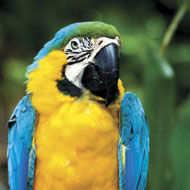Living in captivity

Parrots normally vocalise loudly to communicate being alone.
Speaking in the first lecture of the RVC Clinical Stream at the London Vet Show, RVC lecturer Jo Hedley explored how to recognise and prevent behavioural problems in exotic pets.
Behavioural issues are common in exotic pets and are often the first reason why the pet is presented to the veterinary practice. Beginning her lecture, Jo spoke about how to recognise normal behaviour in small mammals including rabbits, guinea pigs and ferrets.
Jo explained that as small mammals tend to feed and exercise between dusk and dawn, this is ideally the best time to carry out the consult. Digging and chewing - particularly for rabbits - is normal behaviour, as is nipping and biting in ferrets. Jo also stressed that it is natural for these animals hide signs of fear, pain and disease for as long as possible, so problems can be difficult to diagnose.
Delegates were then asked to think about what is abnormal behaviour. Indeed, chewing, digging, aggression and screaming may all be normal in certain situations - such as the nibbling of household wires by rabbits.
One of the common challenges, Jo noted, is parrot screaming. Parrots normally vocalise loudly to communicate being alone (this equates to being vulnerable in the wild). However, screaming commonly occurs when the owner leaves the room, which begins a cycle of abnormal behaviour.
Another common challenge is self-mutilation - particularly common in parrots and rodents. What may start as underlying pain or excessive grooming, may later become a habit.
How can we approach behavioural problems?
"There is no easy fix," explained Jo. "We need to ensure that owners have the appropriate expectations." This includes making owners aware that some treatment will need ongoing management, that there may be multiple long-consults, and that they may need to modify their own behaviour.
• The first step is to obtain a thorough husbandry history. For example, the pet's current set-up, diet and daily routine, as well as opportunities to express normal behaviours.
• Secondly, quiz the owner about their relationship with the animal - such as how often they handle them and the time of day that this takes place.
• Thirdly, question the owner about the problem behaviour. Find out when it started and how it has progressed.
• Lastly, a full medical and clinical exam must be carried out as it is important to always rule out medical problems before diagnosing the problem as a behavioural issue.
Jo concluded her lecture by explaining that for most behavioural problems, the owner's behaviour needs to change. The animals need to be given the correct social structure and the owner must ensure that they are given a balanced diet. How food is presented should be varied so as to promote natural behaviour.



 The veterinary mental health charity Vetlife is inviting the veterinary community to join it for a sponsored cold-water dip.
The veterinary mental health charity Vetlife is inviting the veterinary community to join it for a sponsored cold-water dip.